Devotions
from The Woods @Wanamaker
Need Prayer From Our Pastors? Click Here
|
Hey Church Family!Family is something that shapes us in profound ways. We all come from somewhere. We all have a history. Essentially the story of you doesn't begin with you. You have a family into which you were born. You have a home-town which a culture that shaped you. You have family dynamics that created who you are today. In other words, your past directly affects your future.
A sad reality for many of us is that our past shows up in our present as baggage. A childhood bully who regularly called you names, a high school best friend who betrayed you, a parent who was overly critical of your failures, or a parent who wasn't present—all these events and experiences shape us in profound ways. Unfortunately, the option that many of us choose is to carry the hurt and pain of these experiences with us—sometimes for years or decades. Hebrews 12:1-2 encourages us to lose the baggage that keeps us from being all that God desires for us. So then let's run the race that is laid out in front of us, since we have such a great cloud of witnesses surrounding us. Let's throw off any extra baggage, get rid of the sin that trips us up, and fix our eyes on Jesus, faith's pioneer and perfecter. The reality is you cannot be healed from what you're unwilling to face. Neither do the things we ignore improve. I'd like to encourage you to reflect on some questions in an effort to allow Christ to bring about some healing. The healing comes when we notice how our past has shaped us, but then allow Christ to instruct us on what to do with it. We look back at our past, not to dwell in the pain, nor to find the person we can blame for the way we are. Rather, we look back so that we can begin to take responsibility for the choices we make moving forward. Here are some questions to think about:
I pray that this challenge this week will bring about some new light in your journey with Christ, and lead you into a growing relationship with him. Together in Christ, Pastor Michael
0 Comments
Hey Church Family!Family is something that shapes us in profound ways. Family is complicated. It's also deep. There are incredible highs and depressing lows when it comes to families. Our families can bring out the best in us and the worst in us. They can make us fee great and horrible. For many of us, family is a mixture of both.
As you think about your family, there's an important question I'd like you to wrestle with: What is your hope for your home? What do you want to see happen? It's a significant question. Do you hope for peace? For your kids to grow up and become productive members of society? Do you hope to survive? Do you hope to stick around long enough? What is your hope? We all have hopes for our families, but what do you do with them? The best answer— give them to Jesus. Jesus wants our hopes and our dreams. He also wants our homes. Not because he's possessive, but because he knows that our hearts can quickly shift our affection from him to our hopes or even our homes. He knows that as long as our hope for our home holds on to us, he can't have us. Jesus offers one simple solution: lay it down. Surrender it. Because he knows that life—abundant life—comes through death. It's the power of the cross. Things that die at the cross don't stay dead. They are miraculously resurrected. Its why he longs for us to give ALL to him. Do you know what happens when we hold on to our hopes for our families? We end up walking away sad. (Just ask the rich young ruler in Mark 10.) We end up left out of the life God wants for us. If we seek to control and hold on to our hopes, we will never see all that God has in store for us. So, my challenge for you this week: Wrestle with the question, what is your hope for your family? Then give that hope to God and allow him to take it. He just might have something far greater to give you. Together in Christ, Pastor Michael Hey Church Family!
Ah, graduation season. I can remember my own it like it was yesterday. Graduation season is special because it signals a significant milestone in a person's life. One chapter is closing and a new chapter is beginning. As we think about this season of graduation, we're reminded of some important life lessons. For example, don't rush God's plan. Often graduation is a rush to get to. Remember wanting to graduate so quickly so that you could just move on with your life? Any sort of waiting seemed impossible or worthless. Certainly not beneficial. Have you ever been too quick to do something, only to realize that had you waited a few more minutes or days, things would have turned out better for you? When God gives a promise, you can count on him to keep that promise. Attempting to fulfill God's promises on our own timetable always brings pain. Just ask Abraham and Sarah. And Hagar and Ishmael. When you rush God's plan, it never leads to the life God desires for you. So, don't rush God's plan. Another thought in graduation season is to listen to the right voices. Who you listen to really matters. It's why, as parents, we are picky about who our kids pick for their friends. When I was a youth pastor, I often had teenagers come up to me frustrated with their parents who seemed out of touch with reality. All the teenagers wanted to do was what their friends wanted—so why wouldn't their parents let them? I often asked, "Why would you ignore the voices of the people who love you and care deeply for you—like your parents and your youth pastor?" If you only listen to the voices who tell you what you want to hear, you'll end up in place you don't want to be. Just ask Rehoboam (see 1 Kings 12). Who's voice are you listening to? There are many lessons to learn at graduation season. I'm curious what lessons did you learn? What do you wish someone had told you at your graduation? What advice did you ignore? What lessons do you think of when graduation season comes around? How have you changed since your High School graduation? Where do you see God at work in our young people today? I pray you have a blessed week! Together in Christ, Pastor Michael Hey Church Family!In this series called Simple, we've looked at the invitation that came from Jesus: Follow Me. Jesus invites you and me to follow him. And the truth is we don't know exactly where he will lead us. That was certainly true for the first disciples—it will certainly be true for you and me.
What is incredible about these first disciples' journey is that as they followed Jesus, they came to believe in who he was. In fact, Peter says it like this in John 6, "Lord, to whom can we go? You have the words of eternal life. We have come to believe and know that you are the Holy One of God.” Believing that Jesus is the Holy One of God is significant. Through is death and resurrection, Jesus made us right with God. He stepped in for us and offered himself as the atoning sacrifice. His resurrection brings new life to all who believe. When you believe in Jesus, you believe more than his humanity—he was the Son of God. You believe more than his teaching—that he has the words of eternal life. You believe that he offers eternal life—that he is the Holy One of God. Some of you can remember the time when you came to believe and know that Jesus is the Holy One of God. You can remember the place, who was there, and when it all happened. I encourage you to tell someone today about that moment. Let someone known when you came to believe in Jesus. If you're not confident of that moment, I'd like to encourage you to consider that question. Do you believe that Jesus is more than just a good man and a great teacher? Do you believe he is your Savior? If so, I invite you not only to follow, but also to believe. I pray you have a blessed week! Together in Christ, Pastor Michael Hey Church Family!As a pastor, it is one of the saddest conversations I will occasionally have. From time to time, I meet someone who will say something like, "I could never step foot in a church." It saddens me because somewhere along the way, this person became convinced that church is only for good people. Somewhere in their past—whether from a Sunday School teacher, a pastor, or a maybe even a parent who meant well—they came to understand that God only likes good people. People who follow all the rules. And since they drifted or think of themselves as a "bad person," the church and God have very little for them.
However, throughout the gospels we see that the "bad" people—the most unlikely people, liked Jesus. The people we think would want to avoid Jesus, were drawn to him. And even more shocking than that: Jesus like those same unlikely people. The people Jesus seemed the most comfortable around were the ones the good, religious people tried to avoid. Perhaps that's why they liked him. We see this in the story of Matthew's call to follow Jesus. Matthew was a tax collector. Simply put, he was the worst of the worst. Everyone hated him because he made his living from sin. He broke all the rules. He was a constant reminder to the Jews that they were not in control of their own destiny as a nation. Still worse, Matthew made himself wealthy off of this type of living. Needless to say, very few people liked him. But Jesus liked him. In fact, Jesus saw great potential in Matthew. Jesus saw in Matthew what we all want Jesus to see in us—the possibility of being his follower. We all want Jesus to see in us the potential to learn from him, watch him, grow closer to him. So Jesus calls Matthew to step away from the tax booth and follow him. The invitation to follow is so simple. Yet we make it complicated. Jesus extends the same invitation to you and me: Follow me. Here is a thought on which to reflect: The more we as a church remain focused on following Christ, the more people will feel in our presence what they felt in Jesus' presence—fully loved. I pray you have a blessed week! Together in Christ, Pastor Michael Hey Church Family!We are people of the Resurrection. We have a hope that God will one day do for us what he did for Jesus. We will be resurrected in such a way that death, disease, and decay can no longer touch us. God will undo the effects of sin in our lives. It will be a wonderful day.
But we don't just look forward to that future day. We also live the resurrection today. You and I can experience resurrection life today. New life, today. New hope. New peace. New joy. New satisfaction. All because of Christ's resurrection. As people of the resurrection, there ought to be something different about you because of your relationship with Christ. There ought to be something that has died and was buried with Christ, and in its place, a new resurrected life, with Christ, in its place. People ought to look at you and say, "Something is different... what's going on?" To which you and and ought to be able to say boldly, "Yeah, the old me was crucified with Christ and was buried. I've been raised to new life in Christ." The thing that keeps so many of us from experiencing that new life now, is the way through which we experience new life. You see, Christ only experienced resurrection by first going to the cross. And if Christ went to the cross, so will you and I. There is this counter intuitive principle that shows up over and over in Scripture: life comes through death. What kind of death? What does that look like for you and me? It looks an awful lot like laying aside the rights to be lord and master of your own life. It looks a lot like surrender. It looks like giving over control. It looks like Jesus praying in the garden, "Not my will, but Your will be done." Here are some questions to reflect on as people of the Resurrection: If you have experienced new life in Christ, how are you different from before? What has changed in your life since Jesus came into your life? What do you need to surrender or give up in order to deny yourself and follow Jesus? What have you given up in order to follow Jesus? Was it worth it? I pray you have a blessed week! Together in Christ, Pastor Michael Hey Church Family!
It's almost time! Join us Thursday or Friday evening for our 2nd Journey to the Tomb. Both Thursday and Friday evenings, you will walk through various areas of the church and go on the journey Jesus took to the tomb. We'll start at the Lord's Table, with communion. Then we'll travel to the garden where Jesus prayed, "Not my will, but Your will be done." Then we'll journey to another room to reflect on his arrest, the painful bruises he received, the crown of thorns, the jeering of the crowds, the cross he carried, the final breath he took, and the tomb he was laid in. Each stop along the journey there will be an opportunity for you to remember and reflect on the significance of all that our Savior did for us. It's a wonderful experience, and I encourage you to come and invite a friend to join you. Then, join us at one of our Easter services on April 9 at 9:00 AM or 11:00 AM as we celebrate the incredible miracle of Jesus' Resurrection and the new life we have in Him. We will also have the opportunity to celebrate baptism and the new life several folks have found in Christ. I trust that your Easter weekend will be a time to remember Christ's sacrifice and to celebrate Christ's victory over the grave. Together in Christ, Pastor Michael Hey Church Family!
Character is the will to do what God says is right, regardless of the cost. Character is what we want everyone around us to have—the people we live with, the folks we do business with, the individuals we do life with. We're all for character. But we struggle with our own character flaws. Character is an inside-out work that God wants to produce in our lives. In fact, many of us have tried really hard to produce character, only to fail over and over again. That's why God tells us in Romans 12:2 that transformation only takes place by renewing our minds. Renewing our minds results in character transformation. We've also said that renewal is a two step process: Taking off the old, and putting on the new. God wants us to take off the old ways of thinking, old thoughts, old attitudes, and old patterns. And he wants to replace them with His truth, His promises, and His thoughts. God knows that if we can see this world as He sees it, we wouldn't resist His rule and reign in our lives. If we could see ourselves, relationships, sex, marriage, finances, our jobs, and all of life the way He sees it, we would understand that He has our best in mind. We need to saturate our minds with His truth. We need to memorize His truth so that at the moment of temptation, we can declare—as Jesus did—"It is written." It's replacing the lie with the truth. So let me ask you: have you been filling your mind with God's truth? Or have you been filling it with social media? Are you memorizing God's Word? What makes memorizing God's Word difficult? What specific truth from God’s Word do you need to lean on and memorize this week? We memorize what's important to us. Make it a priority to memorize God's truth this week. Here's a prayer for this week: Lord, give me the wisdom to know what's right and the courage to do what's right, no matter what. Have a blessed week! Pastor Michael Hey Church Family!
We've been talking about character. We've said that character is the will to do what God says is right, regardless of the cost. We've also said that, when it comes to our character, God's desire is for each us to look like Jesus. Our model is Christ. He wants us to act like, look like, love like, have self-control like, be patient and gentle like Jesus. Jesus is the model. And the method for character transformation is renewal of our mind. In Romans 12, Paul lays it out: Do not conform to the pattern of this world, but be transformed by the renewing of your mind. Then you will be able to test and approve what God’s will is—his good, pleasing and perfect will. (Romans 12:2) Renewing the mind results in character transformation. Renewal is a two step process: Taking off the old, and putting on the new. If you've ever refurbished old furniture, it is the same process. You take off the old paint, ripped upholstery, and broken pieces. Then you put on new paint, new upholstery, and replace the broken pieces. The same is true for our minds. God wants us to take off the old ways of thinking, old thoughts, old attitudes, and old patterns. And he wants to replace them with His truth, His promises, and His thoughts. God knows that if we can see this world as He sees it, we wouldn't resist His rule and reign in our lives. If we could see ourselves, relationships, sex, marriage, finances, our jobs, and all of life the way He sees it, we would understand that He has our best in mind. Renewal breaks down our resistance to His will in our lives. The problem is we often settle for lies and live those lies as if they were true. Lies about ourselves, relationships, sex, marriage, finances, our jobs. God wants to remove every lie we've held to and replace it with his truth. So let me ask you: what lies are you tempted to believe? What lies do you use to justify your behavior? What lies have shaped your reactions to people or situations? And what lies have fueled your temptations? As God begins to reveal lies that have become strongholds in your life, the lie will begin to crumble and lose its power over you. Jesus said that truth will set us free. Here's a prayer for this week: Lord, give me the wisdom to know what's right and the courage to do what's right, no matter what. Have a blessed week! Pastor Michael Hey Church Family!
We've been talking about character. Everyone values character. No body ever says that our problem is we have too much character. And since people's lack of character bothers us, I think it's safe to say we all need to pursue character and develop it. When it comes to our character, God's desire is for each us to look like Jesus. Our model is Christ. He wants us to act like, look like, love like, have self-control like, be patient and gentle like Jesus. If you want to know what our character ought to look like, look no further than the one God sent. The problem is, if Jesus is our standard, that's overwhelming. Even with all the time and commitment in the world, we still could never manufacture the character of Jesus in our lives. It's impossible. But what's impossible for us, is possible with our Heavenly Father. While we cannot manufacture the character of Jesus in our lives, God can produce it through us. God doesn't wave his fingers and instantly give us the character of Jesus. Rather, his method for us to gain the very life of Christ is simple, yet difficult for us to do. It's simple, in that, anyone can do it. Yet it's challenging because we want to try to manufacture it on our own. In John 15, Jesus paints a wonderful picture of God's method for who Christ's character is to be produced in our lives. He uses the metaphor of a vine and branch. For any branch to produce fruit, it must remain connected or grafted into the vine. Life will only flow through the vine into the branch if it remains connected. Apart from the vine, the branch dies. No fruit is produced. The same is true for you and me. Christ's life and character will only be produced in us as we remain in constant contact with him. It's uninterrupted fellowship. Uninterrupted relationship. Staying close. As we stay close to Christ, we'll begin to see the very character of Christ appear in our lives. We aren't capable of manufacturing it—God produces it through us. We'll talk more about our participation in the process in the coming weeks. But for now, I want to leave you with this thought: How close are you to Christ? Have you been abiding with him? Or, have you drifted from him? Is your connection with him simply a religious practice? What would it look like for you to be remain connected to him? The invitation for you is for a daily relationship with Christ. One in which we recognize that we can't manufacture the character we need, but he can through Christ. Here's a prayer for this week: Lord, give me the wisdom to know what's right and the courage to do what's right, no matter what. Have a blessed week! Pastor Michael Hey Church Family!
How's your character? Have you ever sacrificed a bit of your character in order to achieve something, gain something, or fulfill a need? What would the people closest to you say about your character? I find it interesting that when I see a lack of character in the people around me, it bothers me more than my own lack of character. The struggle I have with character is in that moment of temptation, I don't always have the will power to do what is right. I often opt to sacrifice a bit of my character for something that has little or lesser value. My problem is that I'm just not consistent—some days I'm a man of great character. Other days, I feel like a man with no character at all. Would any of that be true for you too? We know that God delights in character. Throughout Scripture we see that he loves honesty, rewards humility, and guides us through integrity (Proverbs 11:1-13). He loves character because it is a reflection of his nature. We desperately need to be men and women of character. We need to have the will to do whatever God says is right, regardless of the cost. You know what? We love to bump into people like that. We love to do business with people of character. We love to interact with men and women with integrity, honest, and humility. Why? Because they're the most dependable people. They're incredibly trustworthy. They're committed and follow through. I don't know about you, but I want that for my kids. I want that for everyone around me. But I especially want that for me. Over the next few weeks, I'd like to explore character more with you. For now, I want us to pray this prayer together. I hope you will make it your prayer for the next several weeks. Who knows? Maybe God will will answer this prayer for you. Lord, give me the wisdom to know what's right and the courage to do what's right, no matter what. Have a blessed week! Pastor Michael If we can't make the connection between what God asks us to do and the why behind it, we will usually say, "Forget about it!" Just like a toddler doesn't understand why a parent would say, "Don't touch the hot stove," you and I struggle to understand why God says many of the things he says. Or why God nudges us to do something. It might seem unrealistic. It might not fit within our culture or context. It might seem to go against our lifestyle. Consequently, when this happens, we tend to say, "Nope. I'm not going to do it."
But more than that, when God nudges us, sometimes we have the audacity to tell him, "I've got a better idea!" Somehow you and I have become experts at giving suggestions to God—as if he's open to our suggestions or better ideas. When we don't understand the why behind what God's asking, we have this tendency to take matters into our own hands. For example, God might ask you to tithe, to which you might respond, "I'd rather not. How about I just serve?" When we do this, it demonstrates a confusion in the relationship. We're confused because we evaluate the circumstances of our lives and what's around us and then make decisions based on the value of what's in front of us, rather than on the promises of God. If what's in our hands means a lot to us, we have a hard time letting go of it. And if we think the value of what's in front of us is more important than, or better than the promise of God, it demonstrates that we are confused. For example, if God asked you to take the step of being a volunteer in our Kid's Ministry, you and I will often look at how valuable our time and energy are first, and then make a decision. We do this without even thinking about the promises of God—the promise to always be with us, to never leave us or forsake us. Or the promise that God will give us the words to say and the power to say them. Or the promise that God will not give us anything more than what his strength can handle. You see, we struggle to start with the promises, rather than the value of what's right in front of us. Now, let me just ask this question: How smart is it to argue or debate with God? How wise is it to argue with God over things like your morality? Or who you should date? Or how you should treat your spouse? Or how you should conduct your affairs? How wise is it, really? The sad truth is, we do it all the time and take matters into our own hands. We hold on to what we think is valuable and refuse to trust the God who is faithful and keeps his promises. You see, there are two ways to discover why God says what he says. One way is to submit and apply. The other is to take matters into your own hands. Either way, one day you and I will discover why God asks us to do whatever he's asked us to do. One day all of us will go, "Oh! Now I get it! I finally understand!" The former will lead to a sigh of relief. The latter will result in a sigh of regret. But let me warn you, taking matters into your own hands will have devastating consequences. When Gehazi took matters into his own hands, he quickly discovered there are always consequences—consequences that are tragic and far reaching. (2 Kings 5:19-27) So let me ask you—where is God nudging you? What has he been asking you to do lately or even for the past few years? What do you really have to lose by trusting him? Why not give it a try? Have a blessed week! Pastor Michael Do you ever feel like you're missing the connection between what God is asking you to do and the issue you have? There are many times when we sense a nudge from God to do something, or to stop doing something—but it doesn't always make sense. He rarely tells us why. And then, often the thing he's asking us to do is very uncomfortable. When we can't make the connection between what God is asking us to do and the situation before us, our default response is, "Forget it!"
In 2 Kings 5, we read of story that deals with this very issue. Naaman found himself in that exact situation. He was struggling with leprosy, which is an incurable skin disease that would eventually take his life. He was so desperate, we're told he was willing to go to his enemy with the hope that someone in Samaria could heal him. He thought that Elisha the prophet would come and stand before him, wave his hand over the spot on his arm, call on the name of Elisha's God, and then he would be healed. Instead, Elisha simply sends out his servant to tell Naaman to go wash in the Jordan River seven times. Naaman walks away angry. But thanks to some servants who were willing to talk some sense into him, Naaman decides to give it a try. What did he have to lose, really? On the journey to the Jordan River, I imagine Naaman was thinking to himself, "What's the point? I don't need a bath. I need to be healed of this skin problem." Naaman was healed. But the most fascinating part of this story isn't that Naaman went home rejoicing over the fact that he was healed. He went home rejoicing that he found God. Look at what he says— "Now I know for certain that there's no God anywhere on earth except in Israel." (2 Kings 5:15). He showed up needing to be healed; he left knowing God. He showed up with circumstantial problem; he left spiritually restored. He showed up hoping someone could change his leprosy problem. God showed and changed Naaman. It's crucial for you and for me to understand that this is where God wants to take us over and over again. God longs for our faith and his faithfulness to intersect. Because when our faith and his faithfulness intersect, something will happen in you that will overshadow what happens around you. When your faith and his faithfulness intersect, you meet God and God changes you. Like Naaman, you go, "Now I know! Before I didn't know, but now I do!" The truth is you and I never know what hangs in the balance until we trust God. We might think we know what hangs in the balance, but we really don't. See, the reason God will nudge you and ask you to do something that will take you out of your comfort zone is to facilitate trust. And trust is needed for our relationship with God to work. So let me ask you—where is God nudging you? What has he been asking you to do lately or even for the past few years? What do you really have to lose by trusting him? Why not give it a try? Have a blessed week! Pastor Michael Over the past few weeks we've been diving deeper into The Lord's Prayer. I hope you've enjoyed this journey with me as we look at what Jesus knew—because if we knew what Jesus knew, we'd pray like Jesus prayed. "Give us today our daily bread. And forgive us our debts, as we also have forgiven our debtors. And lead us not into temptation, but deliver us from the evil one." (Matthew 6:11-13)
In the final section of The Lord's Prayer, we see that Jesus knew there was a daily emptiness that needed to be filled. In other words, we all have a daily need for God to fill even our most basic needs. This final section of Jesus' prayer is our declaration of dependance on God. We depend on him to fight for us in the most practical areas of life. We need him day by day, moment by moment, breath by breath. We need him for all of our provision. We need God for food, health, shelter, finances, relationships, and so much more. Jesus teaches us that we must depend on God to provide. Matthew chapter 6 reminds us that God already knows every need we have. And our Father in Heaven is pleased to provide for his children. So it matters that we seek him first. You and I are not to live like those who don't have a Father in Heaven. For you and me, this means we ought to be "please & thank you" kind of people—asking God for his provision and thanking God for all he's done. How have you been praying please and thank you? Jesus also teaches the need for us to remember our own forgiveness in order to appropriately relate with those around us. Forgiveness to others is based our own forgiven status before God. We often don't like the idea of forgiving those who have hurt us. The truth is, we couldn't forgive, had it not been for our own forgiveness. If we're having trouble forgiving others, maybe we should spend a little more time reflecting on own sin and what it cost God to give us. I suggest to you that we would eventually understand how desperate God wants us to forgive those who have hurt us once we understand the magnitude of our own forgiveness. How have you been praying to forgive as you have been forgiven? Jesus also teaches us that when we pray, one of the best practices we can take on is to ask for spiritual protection from Satan's traps and snares. Satan is trying to undo you and everything good from God. He has schemes and traps designed to keep you from living the way God desires. Jesus understood this, and he encourages us to pray so that we would be protected from these traps and snares. But Jesus also teaches that, should we give into temptation, we would not stay trapped. He prays that Satan's plans would not keep us from living God's mission. What would it look like to have God's spiritual protection over you? How are you doing at praying for God's protection and winning against Satan's attacks? Let me ask you, how's your prayer life? What have you been praying for lately? What is your prayer for 2023? I hope these past few weeks have been challenging, yet good. Have a blessed week! Pastor Michael Jesus knew something about prayer. And if we knew what Jesus knew, we'd pray like Jesus prayed.
Jesus knew that prayer must begin with God. In other words, the order of our prayers matters. Jesus teaches his disciples to pray like this, "Our Father in heaven, hallowed be your name. Your kingdom come, your will be done, on earth at is it in heaven." Why start with God? Because Jesus knew that there is no one above God—no one more worthy, more perfect, or more loving than our Heavenly Father. Starting anywhere else in our prayers is problematic. Without God as our starting point, we'd surely turn out prayers that sound more like, "Hallowed by MY name. MY kingdom come, MY will be done, in heaven as it is on earth." Jesus also knew that before we get to our kingdoms, we needed to first surrender to him. Prayer is our method for surrendering control, not securing it. Surrendering control is never easy. It can feel like a roller coaster—eyes tightly shut as we hold on for dear life. When it feels like you're holding on for dear life, facing the unknown, and don't want to let go, remember this: God's name is hallowed. Holy. Perfect. Above all others. He's all-powerful, all-knowing, and all-loving. In other words, you can trust him. But Jesus also knew surrender means God's will, God's way. It can't be God's will, MY way—which is often what I prefer. Rather, it's taking the example of Christ, who prayed, "My Father, if it is possible, may this cup be taken from me. Yet not as I will, but as you will." (Matthew 26:39) Let me ask you, how's your prayer life? What have you been praying for lately? What is your prayer for 2023? For the next few weeks, I'd like to challenge you to approach prayer differently—reflecting on how Jesus prayed. Have a blessed week! Pastor Michael Click here if you would like prayer from our pastors. Have you ever noticed that the disciples never asked Jesus to teach them how to preach? They heard the greatest sermon ever preached by the greatest preacher on earth, yet not one of them asked Jesus to teach them to preach. The disciples didn't ask Jesus to teach them to do miracles either. They saw the greatest miracles by the greatest miracle worker.
What they did ask is, "Lord teach us to pray." (Luke 11:1) They saw something different in Jesus when he prayed—and they wanted it. Jesus knew something they didn't about prayer, so his prayer life was different than anything they had seen or experienced. So naturally, they asked him to teach them. Jesus knew something about prayer. And if we knew what Jesus knew, we'd pray like Jesus prayed. Jesus, looked at his disciples and said, "This, then, is how you should pray: 'Our Father in heaven.' (Matthew 6:9) Jesus knew that we can never outgrow God. He's the God in heaven, and you cannot get any bigger than God. Nor will you ever outgrow your need for him and his power and strength in your life. Jesus knew that prayer is a heart engaged relationship. It's not a formula—it's the Father we pray to. While God is in heaven, he's also imminent. In other words he's close and personal. Jesus knew we could approach him as a child does a father. Jesus knew that "our" is a bigger family. We're not alone when we pray. It's great to have your private prayer time, but it's wonderful and powerful to pray together. It can be awkward, but the good news is, your words are not what is powerful. God's Word is powerful. Praying for each other, and asking for prayer is something we need to do regularly. Jesus also knew that prayer is life shaping. Prayer isn't a way to get what you want. Rather, prayer cultivates trust in our lives. It encourages us to look more carefully at the one to whom we are praying. This Father in Heaven is all-powerful, all-loving, and all-knowing. He's able, willing, and wise. Jesus knew all this. That's why he prayed the way he did. Let me ask you, how's your prayer life? What have you been praying for lately? What is your prayer for 2023? For the next few weeks, I'd like to challenge you to approach prayer differently—reflecting on how Jesus prayed. Have a blessed week! Pastor Michael Gift giving is a wonderful aspect of Christmas. We love to give surprises. We love to give something that a family member will enjoy or need. We love the smile on their faces at they tear into the gift. Typically at Christmas, we see this concept of balance take place. You give me a gift, I'll return the favor. We even go to great lengths to make sure we're not in a situation where someone gives us a gift and we have nothing ready to give back. I know someone who always has gift cards on the ready just in case someone brings a surprise gift that they weren't expecting to receive. If it happens, they simply go to their stash, pull out a card and have it ready to go for them.
Let's be honest—at Christmas we long for there to be balance when it comes to gift giving. We don't like it when someone gives us a gift and we don't have anything for them. Otherwise it will feel like we owe them something. Christmas deals with this idea of balance. At Christmas we see that God threw out the scales. He didn't seek balance in what he gave. In fact, there's no scale on which you could place God's gift to us. God gave everything, we gave nothing. He didn't want it to be even first. God didn't measure the scales and then decide to give. Rather, he gave his Son without blinking—without any reservation or second guessing. God gave us his very best and refused to let our actions determine his action. We're told in John 3:16, "God so loved the world that he gave his Son, that whoever believes in him would not perish but have eternal life." God loved, so God gave for everyone. Our response to this generous act of God? It's not to get him a gift—remember there's no scale. You couldn't afford it anyway. Rather, our response ought to be to love as God loved. To love in such a way that the scales are thrown out. To love people without reserve, or without expecting the favor to be returned. Who is difficult for you to love? In other words, who do you find challenging to love because they rarely (if ever) pay back your love? You could be like everyone else—measured, balanced, and transactional— or you could be more like God, who throw away the need for balance. What if this Christmas you said, "I'm going to love them no matter how they respond." Even if nothing in them changed, at the very least, it may just be you. Have a blessed week! Pastor Michael During the third week of Advent, we focus on the theme of joy. Joy does not come to us from the absence of pain and sorrow. Rather joy is a practice—something we choose to develop in our lives over time. And the question we often wrestle with is how do we live in such a way that our joy knows no bounds in spite of the troubles we experience? How do we hold sorrow in one hand and joy in the other hand?
The Apostle Paul knew how. And to begin, we must first acknowledge that Paul refused to deny or ignore the problems and troubles that he endured. In his letters he regularly mentioned his troubles. He would reference his chains in prison (Philippians 1:7) or a thorn in his flesh, a messenger from Satan (2 Corinthians 12:7). Paul understood something crucial: that even though _____ was happening, joy could be found. Even though Paul was locked up in prison for no crime, joy could be found. Even though his plans did not pan out, there was joy. Even though relationships didn't turn out the way he'd hoped, there was cause for joy. Paul understood there was a bigger picture, and that often when he couldn't make sense of the picture, he would need to look at it from a different angle. Much like an image zoomed in so close that we can't see what it is until we zoom back out—Paul would regularly need to zoom out to see how God was working. For example, when he was in prison, he refused to let that keep him from sharing the gospel. In fact, he essentially said in Philippians 1:12-13, "I'm not chained to this prison or these palace guards. No! They are chained to me! And now I have a captive audience." As a result, those tasked with guarding him heard the gospel—and many of them responded in faith. And so, he challenges you and me to live the same way. In Philippians 1:27 he says, "Whatever happens, conduct yourselves in a manner worth of the gospel of Christ." In other words, if you sense the problems rising, or the sorrow overwhelming, how should you act? In a way that will be worthy of the Good News of Jesus Christ. You see, Jesus is our example in this matter—who "for the joy set before him, endured the cross, scorning its shame, and sat down at the right hand of the throne of God." (Hebrews 12:2). Jesus knew pain and sorrow—yet he could see joy as he endured and persevered through it. Jesus is our example of someone who knew both joy and sorrow. My challenge for you this week: Ask yourself what is my worthy action today? When you're facing a difficult situation—one filled with pain, uncertainty, or sorrow—what would Christ have you do? Remember joy is a practice or habit that we take on and develop. Advent reminds us of the joy that comes through Christ. Here are some questions for reflection:
Have a blessed week! Pastor Michael During the second week of Advent, we focus on the theme of peace—something our world desperately needs.
Peace is not just the absence of problems. Peace is also the presence of a redeemer who makes us whole. In other words, Christ is at work in our lives, making us whole, as we were intended to be. What's amazing about this work of Christ is he begins by offering us peace with God. Romans 5:1 says, "Therefore, since we have been justified through faith, we have peace with God through our Lord Jesus Christ." When we place our trust in Christ, our relationship with God is made right. Trusting in Christ means that we are not only saved from our sins. We are also given Christ's righteousness. Our sin has been undoing everything God wanted to have happen. The death and resurrection of Christ reverses that destructive path, and begins to make all things new or whole or as they were meant to be. We have peace with God. Additionally, we are given the same peace that we see in Jesus throughout the Gospels. Jesus says in John 14:27, "Peace I leave; my peace I give you." We can have the same peace that was in Jesus during the storm on the boat when the disciples were afraid for their lives. It's the same peace we see in Jesus when the Pharisees tried to trap him in saying something wrong. The same peace we see when the crowds pressed in on Jesus and brought their sick, lame, deaf, and mute. That's the peace Jesus gives. So when the doctor says, "I'm sorry there's nothing more we can do"—Jesus offers his peace. When that phone call turns your world upside down—Jesus is right there with his peace. It's a peace that is present, making us whole. But there's one more element of this peace of Christ. It's a peace of which we are called to be conduits. In Matthew's gospel, we see Jesus declaring, "Blessed are the peacemakers, for they will be called children of God." (Matthew 5:9) If we call ourselves followers of Christ, we have a job. We—just like Jesus did—are to enter into places where there is no peace in oder to offer the peace of God. In other words, since we've been reconciled to God, we are to be about the work of reconciliation—making things right, whole, the way they were intended to be. My challenge for you this week: Trust & Obey. The peace we long to experience comes only through a relationship with Christ. It is a relationship in which we regularly give more and more of our trust to him. A simple prayer is this: "I give everything and everyone to you." It is also a relationship in which, day by day, we follow his example and remain obedient to what he calls us to. This is what Advent teaches us. Here are some questions for reflection: - Is everything alright between you and God? Is there peace? - How is peace connected to trusting and obeying Christ? - Are you helping or hindering peace in this world? How can you be a peacemaker this week? Have a blessed week! Pastor Michael Ah, the season of Advent! Such a wonderful time. It's a time of preparation. Like the old carol sings, "Let every heart prepare him room." This is exactly the idea behind Advent. It's taking some time to prepare for Jesus to enter into our worlds. To enter into our joys as well as our sorrows.
During the first week of Advent, we focus on the theme of Hope. Hope is future oriented faith. It's what pulls us into tomorrow. Thinking about the future tends to be done in two ways: counting down or counting up. For example, we count down to Christmas—a fixed and known date. But so much of life is like counting up—we know it's coming, we just don't know exactly when. Maybe you've been counting up to a relationship, and you don't know if it will ever happen. Or maybe you've been counting up to the time when your kids will turn to Christ. Maybe you've been counting the number of days to something very important, and it's a rather large number. But it's been so long that you're starting to wonder will it every happen. Advent is both a count down and a count up. In the midst of our counting, we see in Scripture that Christ brings hope to our lives. We have hope because of what Christ's first advent ultimately provided for us. Christ has saved us from our sins and dealt with our past. Christ is also now preparing for us a future. And Christ is actively working in our present. We have hope because of what Christ has done, is doing, and is going to do. It doesn't mean that there is no pain or suffering. Oftentimes suffering is attached to the waiting we are in. It simply means that we know that God has, will, and is currently working. In fact, God never wastes a pain or hardship. He'll use every moment to shape and mold us more into the image of his Son, Jesus. In fact, he just might be using your situation to reveal to you the place where you've been putting your hope. My encouragement for you this season: show up. Keep showing up in your worship. In your prayers. In God's Word. Keep showing up in fellowship with other Christians. Why? Because you never know when God will move. This is what Advent teaches us. Here are some questions for reflection: - Is there anything you are counting down to? How about counting up? - How does the fact that God has taken care of our past, is giving us a future, and is working in our present give us hope? - What are you hoping for this Advent season? Have a blessed week! Pastor Michael This call Jesus gives in John 20:21 is an invitation to join him in what he started. "As the Father has sent me, I am sending you," Jesus tells his frightened disciples. He enters into their fears, and speaks peace. He enters into their broken worlds—the mess of sin and the harsh realities of life—and sends them into the broken worlds of the people around them.
It's the same for you and me. We must respond to this invitation. We can respond with prayer. Prayers are essential to the work of the gospel. In fact, Paul petitioned the church in Ephesus, saying, "Pray also for me, that whenever I open my mouth, words may be given me so that I will fearlessly make known the mystery of the gospel, for which I am an ambassador in chains. Pray that I may declare it fearlessly, as I should." (Ephesians 6:19-20). We can join Paul in this wonderful prayer—that our missionaries around the world can fearlessly make known the mystery of the gospel. We can also respond to the call as God's people. God calls many to full- or part-time ministry. Throughout Scripture we see many individuals whom God called to vocational ministry. If you've been called, might I suggest that you answer the call—do not run from it. While not everyone is called to full- or part-time ministry, all of us have been called to share the gospel, to witness to the power of the resurrection, to clothe the naked, feed the hungry, and visit those in prison. If we open our hearts to God, we will hear God calling us to some form of service for him. We also respond to this invitation with our resources. The truth is we've been blessed in order to be a blessing. By sharing what God has given us, we are able to partner with those whom God has called. Through our faithful giving, missionaries can go to places that you and I cannot go. We can give generously because we serve a generous God. Have you considered what you can give for Faith Promise this year? I challenge you this week to be praying how God would want you to give. Remember, this is not a calculated pledge. Rather, it is a promise that is made by faith—knowing that God will do far greater things than we would if we hold onto it. Have a blessed week! Pastor Michael Losing your car keys is frustrating. Losing your purpose? Well, that's a whole different challenge.
This week I want to remind you of the significance of God's mission and our participation in that mission. God wants to see as many people as possible join his family—and God gives us the task of partnering with him in this important work. Shortly after the resurrection Jesus said, "Peace be with you. As the Father has sent me, I am sending you." (John 20:21) The disciples spent three years with Jesus. Now they were terrified of going outside. Afraid of what could happen, they huddled in fear behind locked doors. That's precisely when Jesus entered the room, into their fear, spoke peace over them, and pointed them outward. We all have this tendency to turn inward and lose site of the work to which God has called us. Sometimes it's because of fear. Sometimes it's out of frustration with what's going on "out there." Either way—Jesus enters into it and reminds us of our purpose. In this wonderful moment with his disciples, Jesus sends them out in a way characterized by his own example. He said "AS the Father sent me, I'm sending you." We are to go in the same manner in which Jesus was sent. Jesus left his throne in heaven and entered our brokenness. He walked into the harsh realities of our lives. He experienced the same mess we all see. This is exactly how Jesus wants to send us out—into the hurt, pain, and brokenness of those around us. We're sent out; but we're also sent out to those who need the hope and healing Jesus offers. This week I'd like to ask you, how are you entering into someone else's pain and brokenness? Who has God placed in your path? For whom can you be the hands, feet, or mouthpiece of Jesus this week? What is one step you can take today to be sent, as the Father sent Jesus? Have a blessed week! Pastor Michael Let's wrap up our conversation on the heart with one final area that is perhaps the most challenging of all.
We all get angry when we don't get what we want. Show me an angry person, and I'll show you a hurt person who didn't get something they wanted. They're angry because someone took something from them. Perhaps you've heard or even said something like this:
Is there a debt causing anger in you? Paul presents a very intriguing word picture that illustrates how we are to deal with anger. In Ephesians 4:26-27, Paul's question is not, what caused you to become angry? Or how will you be paid back when you're angry? Rather he seems to be more concerned with moving forward. So his question is more along the lines of, "How long do you want to carry the anger with you?" In other words, how long are you going to allow the people who have hurt you to control your life? Will another month do? Another year? Another season of your life? How long? Paul's suggestion? Hold on only as long as the sun is shining. He says, "Don't let the sun go down on your anger." Or to put it another way, today should be the day that you quit holding onto your hurt and anger. After that he lays out the key to getting rid of it: choosing to forgive. When you chose to forgive, you're canceling the debt. They can't pay you anyway. How could they? This is why Paul says, "... forgiving one another, just as God in Christ forgave you." (Eph 4:32) Jesus had no part in any of our sin. He was blameless. You and I are the ones who had major debt. We all had open accounts, and according to the records we owed big time. It did not look good for us. In fact, Paul says that we were dead in our sins and trespasses. (Eph 2:1) We owed God a lot. And we could not pay him back. So you know what God decided? He said, "You know what? According to my records, they owe me. But they can't pay me back—there's no way. I think I'll just close the book. I'll cancel the account and declare them 'Forgiven.' Why? Not because they've paid me back or made things right. But because I love them, 'Debt cancelled.'" Then in His generosity, He paid the price with His own Son. God in Christ has forgiven you. The essence of forgiveness is declaring, "You don't owe me anymore." Surely what God has done for you, you can do for the person who has wronged you. Here are a few questions for reflection:
Pastor Michael Today let's talk about the third area over which to guard our hearts: Greed. Let's dive in a little deeper.
Greed happens when we feel that we deserve more and more. Greed says, "I owe me." Jesus said, "Watch out! Be on your guard against all kinds of greed." (Luke 12:15). Why? Because of all these areas we've mentioned so far, greed seems to be the most subtle. Oftentimes greed can go undetected and we rarely look in the mirror and notice its presence. An unguarded heart is prone to open the door to greed. Later Jesus revealed the lie that fuels greed: "Life does not consist in an abundance of possessions." He knows there there are times when we can easily be swept up into believe that somehow our lives equal the acquisition of more and better things. After telling a parable, Jesus defines a greedy person: it's someone who stores up things for himself or herself but isn't "rich toward God." (Luke 12:21). In other words, a greedy person is the man or woman who saves carefully but gives sparingly. For Jesus, generosity is what breaks the power of greed. That's why he challenges his followers to give it all away. You see, if you can give it all away, you no longer give sparingly. Jesus' challenge cuts to the heart—whether or not you think you have extra, give generously. We're challenged to give to the point that it forces us to adjust our lifestyles. In fact, Jesus says that if our giving doesn't adjust our lifestyle, it's a kind of greed. Here's what Jesus is getting at—if you're consuming to the point of having little or nothing left to give, you're greedy. If you're saving to the point that there's little or nothing left to give, you're greed. I know that's harsh. But it's true. The habit of generosity breaks the power that greed has on our hearts. It's the habit that changes everything. Here are a few questions for reflection:
Pastor Michael Let's look at another area to keep watch over our hearts.
Jealousy is rather interesting. Most of us would like to believe that we are "above" jealousy. It was something we may have struggled with in middle school or our elementary years, but not anymore. However, if you've ever found yourself looking around at what others have and feeling a sense of lack—whether that be possessions, looks, skills, opportunities, health, height, inheritance, or any other factor—chances are you've experienced a little bit of envy. Interestingly, we assume our problem is with the person who possesses what we lack. So we avoid them or mistreat them. We make comments that are riddled with criticism. Our problem, however, isn't really with the other person. Our problem is actually with God. God could have fixed all of that for us. Whatever He gave your neighbor, God could have given to you too. He could have made your life just like theirs—or better. But He didn't. Jealousy ultimately says, "God owes me." The sad news is that jealousy can terrorize your life and cause chaos in your relationships. The remedy to this monster is to turn to God and to celebrate the goodness and wisdom of God in others. Check out what James has to say about this matter: What causes fights and quarrels among you? Don’t they come from your desires that battle within you? You desire but do not have, so you kill. You covet but you cannot get what you want, so you quarrel and fight. You do not have because you do not ask God. When you ask, you do not receive, because you ask with wrong motives, that you may spend what you get on your pleasures. (James 4:1-3 NIV) James says that many of our problems with others are the result of desires that have worked their way to the surface. We want something, but we don't have it, so we fight and quarrel with others. The desires James is referring to in this passage represent unquenchable thirsts—our thirsts for more stuff, money, recognition, success, progress, intimacy, sex, fun, and relationships. So what do we do with these desires for more? James says to take the desires to the one who created them in the first place. In other words, James is giving us permission to pour out our hearts in an unfiltered conversation with our Creator. Every concern you have—great or small—matters to our Father because you matter to the Father. Whether it pertains to your love life, your career, your marriage, your parents, your children, your education, your finances, your appearance—James says take it to God. As you take it to God, there's one next step to consider: publicly celebrate God's goodness. Particularly, you celebrate God's goodness in other people's lives. When you celebrate God's goodness, you will not only be reminded of how good and great God is, but you will also begin to shine a light on the very things for which your heart is aching. As you do this, jealousy begins to lose its power. Here are a few questions for reflection:
Pastor Michael |
AuthorNotes from the Staff @The Woods Archives
March 2023
Categories |


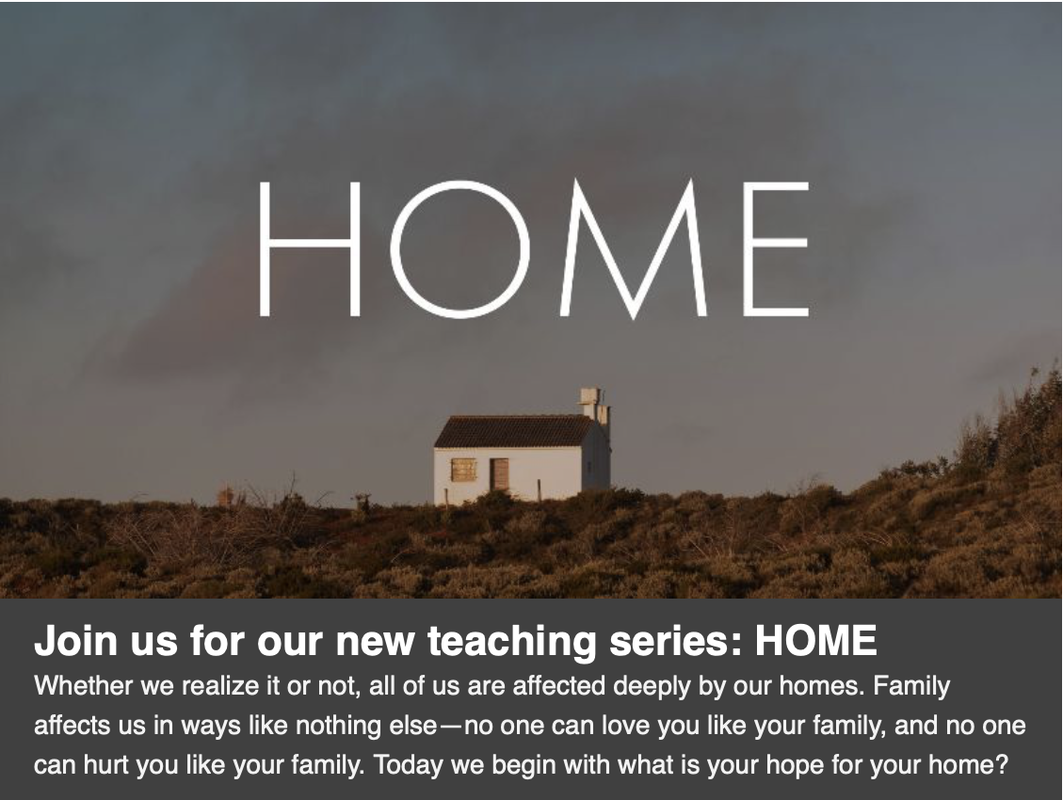

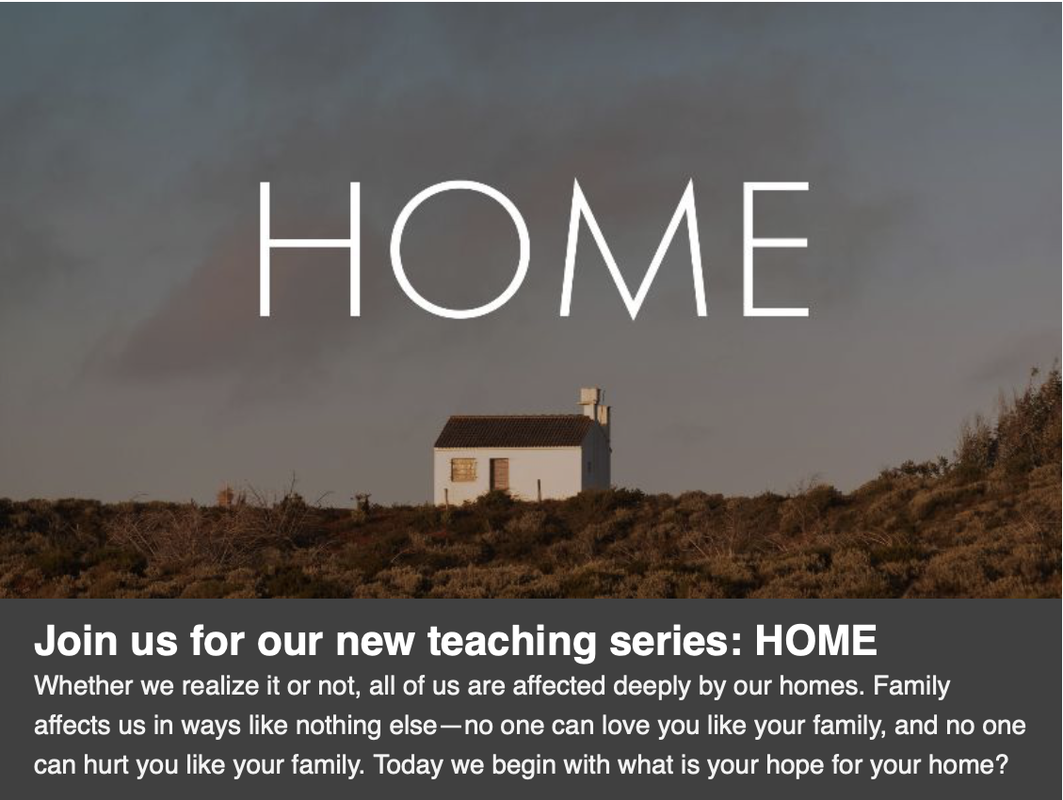
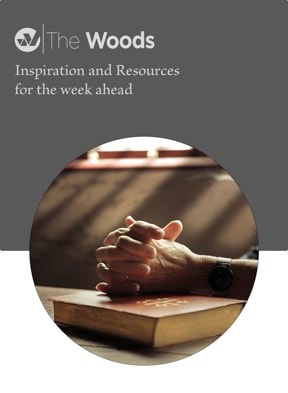




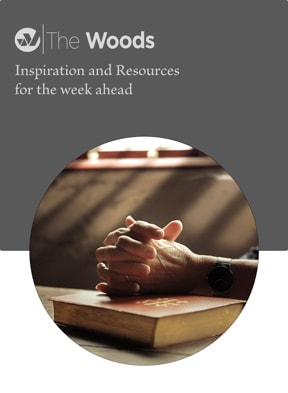


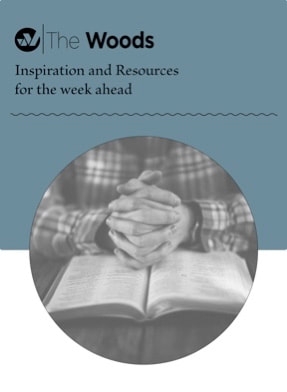
 RSS Feed
RSS Feed
